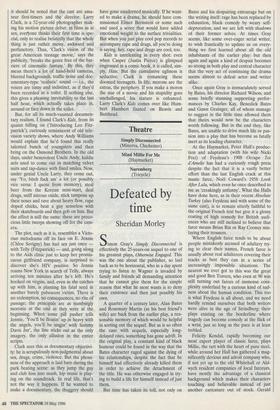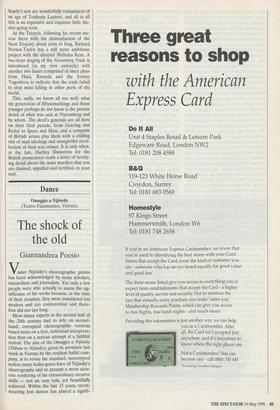Theatre
Simply Disconnected (Minerva, Chichester) Mind Millie For Me (Haymarket) Nuremberg (Tricycle)
Defeated by time
Sheridan Morley
Simon Gray's Simply Disconnected is effectively the 25-years-on sequel to one of his greatest plays, Otherwise Engaged. This was the one about the publisher, so laid back as to be horizontal, who in a day spent trying to listen to Wagner is invaded by family and friends all demanding attention that he cannot give them for the simple reason that what he most wants is to deny their existence and then just possibly his own.
A quarter of a century later, Alan Bates and Rosemary Martin (as his best friend's wife) are back from the earlier play, a rea- sonable memory of which would be helpful in sorting out the sequel. But as is so often the case with sequels, especially long- delayed ones, something has gone adrift. In the original play, a constant kind of black humour could be found in the way that the Bates character raged against the dying of his relationships, despite the fact that he himself had effectively already killed them in order to achieve the detachment of the title. He was otherwise engaged in try- ing to build a life for himself instead of just them.
But time has taken its toll, not only on Bates and his despairing entourage but on the writing itself: rage has been replaced by exhaustion, black comedy by weary self- deprecation, and we are left with shadows of their former selves. At times Gray seems, like some over-eager serial writer, to wish frantically to update us on every- thing we first learned about all the old inhabitants of the earlier play: but then again and again a kind of despair becomes so strong in both play and central character that the very act of continuing the drama seems almost to defeat actor and writer alike.
Once again Gray is immaculately served by Bates, his director Richard Wilson, and some briefly stunning supporting perfor- mances by Charles Kay, Benedick Bates and Gawn Grainger, all of whom manage to suggest in the little time allowed them that theirs would now be the characters worth following. But in the end they, like Bates, are unable to drive much life or pas- sion into a play that has become as fatally inert as its leading character.
At the Haymarket, Peter Hall's produc- tion and adaptation (with his wife Nicki Frei) of Feydeau's 1908 Occupe Toi d'Amelie has had a curiously rough press despite the fact that it is a vastly better effort than the last English crack at this manic farce, Noel Coward's 1958 Look After Lulu, which even he once described to me as 'creakingly unfunny'. What the Halls have done here, as in their recent Absolute Turkey (also Feydeau and with some of the same cast), is to remain utterly faithful to the original French text but give it a glossy coating of high comedy for British audi- ences who are still inclined to believe that farce means Brian Rix or Ray Cooney mis- laying their trousers.
Where English farce tends to be about people mistakenly accused of adultery try- ing to clear their names, French farce is usually about real adulterers covering their tracks as best they can in a series of increasingly impossible situations. The nearest we ever got to this was the great and good Ben Travers, who even at 90 was still turning out farces of immense com- plexity underlaid by a curious kind of sad- ness about the human condition. This too is what Feydeau is all about, and we need hardly remind ourselves that both writers were alive in the age of Strindberg: their plays existing on the borderline where tragedy can become comedy at the flick of a wrist, just so long as the pace is at least trebled.
Felicity Kendal, rapidly becoming our most expert player of classic farce, plays Millie, the tart with the heart of pure steel, while around her Hall has gathered a mag- nificently devious and adroit company who, if not yet up to the old Whitehall or Ald- wych resident companies of local farceurs, have mostly the advantage of a classical background which makes their characters touching and believable instead of just another caricature out of stock. Gerald Scarfe's sets are wonderfully reminiscent of an age of Toulouse Lautrec, and all in all this is an expensive and exquisite little the- atre-going treat.
At the Tricycle, following his recent suc- cess there with the dramatisation of the Scott Enquiry about arms to Iraq, Richard Norton-Taylor has a still more ambitious project with the director Nicholas Kent. A two-hour staging of the Nuremberg Trials is introduced (in my view unwisely) with another two hours comprised of short plays from Haiti, Rwanda and the former Yugoslavia to indicate that the trials failed to stop mass killing in other parts of the world.
This, sadly, we know all too well: what my generation of fiftysomethings and those younger perhaps do not know is the precise detail of what was said at Nuremberg and by whom. The devil's generals are all here on their final parade, from Goering and Keitel to Speer and Hess, and a company of British actors play them with a chilling mix of mad ideology and unregretful recol- lection of their war crimes. It is only when, at the last, Hartley Shawcross for the British prosecution reads a letter of terrify- ing detail about the mass murders that you are chained, appalled and terrified, to your seat.



































































 Previous page
Previous page